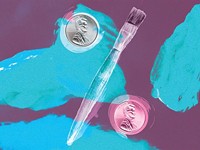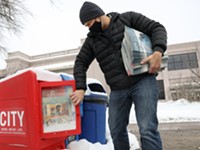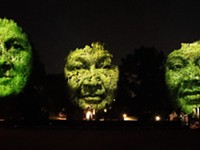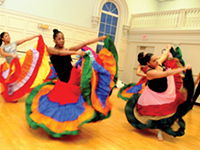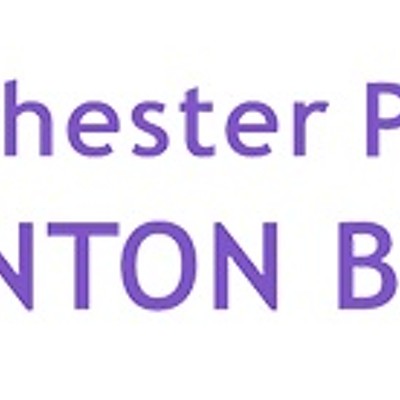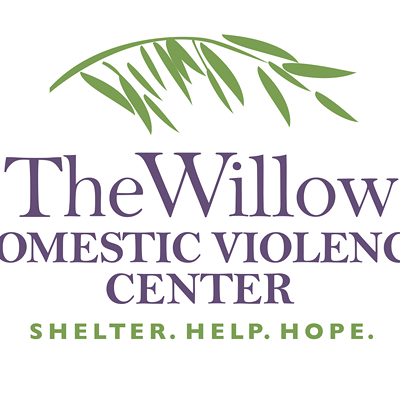click to enlarge


PHOTO BY OSAMA SHUKIR MUHAMMED AMIN VIA WIKIMEDIA COMMONS
One of the earliest known depictions of a handshake is 9th-century B.C.E. carving depicting the Assyrian king Shalmaneser III shaking the hand of the Babylonian king Marduk-zakir-shumi I to seal an alliance.
[
{
"name": "500x250 Ad",
"insertPoint": "5",
"component": "15667920",
"parentWrapperClass": "",
"requiredCountToDisplay": "1"
}
]
I shook a man’s hand the other day.
He was a former colleague I hadn’t seen in a couple of years. When we spotted each other we smiled and I instinctively raised my hand waist high, thumb up at a right angle. He returned the gesture and we clasped, web to web.
There was something so familiar about the custom, and yet, with the idea that our hands carry a potentially lethal cocktail of germs having been firmly implanted in our heads over the last year, so illicit.
“Are we shaking hands again?” I asked.
“I think we are,” he replied.
We both agreed it felt good.
Obituaries have been written for the handshake ever since the universal, go-to greeting was abruptly exiled in March 2020 after some very smart and influential people suggested that it be consigned to history.
In the early days of the pandemic, Dr. Anthony Fauci, whose role as the country’s infectious disease expert had turned him into an American hero overnight, questioned whether shaking hands was ever a good idea and said, “I don’t think we should ever shake hands ever again, to be honest with you.”
The handshake, the obituaries reported, was survived by the elbow bump, the foot shake, the peace sign, the wave, and the knowing nod of the head.
But reports of the handshake’s death, like that of Mark Twain and Bob Barker, have been greatly exaggerated.
The pandemic has taught us many things about the way we live and approach public health hygiene. Many of them we would be wise to keep close.
We learned, for example, that wearing a mask is incredibly helpful in stopping the spread of respiratory illnesses — as people in many Asian countries have known for decades.
We learned, too, that consistent and thorough handwashing is a good thing, as is staying home from work or school if you’re sick.
But the pandemic also taught us that elbow bumps, foot shakes, peace signs, waves, and the knowing nods of the head are no replacement for the human connection made with the handshake. They just aren’t the real thing.
Handshakes have solidified peace treaties, sealed business deals, exemplified grace in victory and defeat, and taught each of us a thing or two about the person on the other end of our grip. They are windows into the soul.
The dead-fisher? He can’t be trusted. The bone-crusher? He’s pompous. The fingertip-gripper? She has arthritis. The fist bump, characterized by a wispy meeting of the knuckles, reveals nothing.
We’ve long known that hands are petri dishes of germs and grime. But to clasp hands is to overlook the grime factor as a matter of trust and to feel each other out.
Is that stupid? The good doctors who recommend doing away with the handshake might think so. But, I don’t think they understand what they’re asking.
Dr. Herbert L. Fred, a Houston physician, is an exception. He has opposed the proposals of some hospitals to ban handshakes.
It isn’t that Fred doesn’t buy into the science that handshakes can transmit pathogens. The science is unequivocal. Some research suggests that replacing the handshake with a fist-bump reduces the transmission of bacteria by 90 percent.
But in writing in the Texas Heart Institute Journal in 2015, Fred called banning handshakes in healthcare settings “a cop-out” that conveys the impression that patients and doctors are harmful to one another.
“I see the ban as a cop-out, a move that misses the point,” Fred wrote in the publication. “The problem isn’t the handshake; it’s the hand-shaker.”
What is needed, he said, is more diligent handwashing on the part of everyone, but especially doctors.
“No other gesture of greeting can duplicate the benefits of a firm handshake,” Fred wrote. “The handshake has long been, and still is, an invaluable bonding tool.”
The earliest recorded handshake is said to have been carved into a limestone dais in the mid-ninth century B.C.E., depicting the Assyrian King Shalmaneser III hand in hand with a Babylonian ally. Homer described handshakes in “The Iliad” and “The Odyssey” as displays of trust. Clasped hands were stamped on ancient Roman coins.
The gesture, argues Ella Al-Shamahi, a paleontologist and comedian and author of “The Handshake: A Gripping History, is more biological than cultural. “It’s programmed into our DNA,” she wrote recently in The Guardian.
I think she might be right.
When I extended my hand to my former colleague, I did so reflexively. But it was more than just an old habit.
Throughout the pandemic, I’ve consciously resisted shaking hands. This time, though, there was something primal in the move. I didn’t realize I had reached out to him until our hands met and the sensation reminded me of how much I had craved that interaction. I think subconsciously I wanted to touch him.
The handshake has its perils, the transmission of disease being chief among them.
But they also come with expectations — grip firmly, make eye contact — and can lead to mistaken first-impressions of a person.
That dead-fisher? He might be father-of-the-year. That bone-crusher. Perhaps he’s just really strong. That fingertip gripper? Maybe she’s royalty.
If the pandemic taught us anything, though, it is that touch matters and that our impulse to reach out to each other is natural. Do it again, and you’ll see.
I now wash my hands of the matter.
David Andreatta is CITY's editor. He can be reached at [email protected].
He was a former colleague I hadn’t seen in a couple of years. When we spotted each other we smiled and I instinctively raised my hand waist high, thumb up at a right angle. He returned the gesture and we clasped, web to web.
There was something so familiar about the custom, and yet, with the idea that our hands carry a potentially lethal cocktail of germs having been firmly implanted in our heads over the last year, so illicit.
“Are we shaking hands again?” I asked.
“I think we are,” he replied.
We both agreed it felt good.
Obituaries have been written for the handshake ever since the universal, go-to greeting was abruptly exiled in March 2020 after some very smart and influential people suggested that it be consigned to history.
In the early days of the pandemic, Dr. Anthony Fauci, whose role as the country’s infectious disease expert had turned him into an American hero overnight, questioned whether shaking hands was ever a good idea and said, “I don’t think we should ever shake hands ever again, to be honest with you.”
The handshake, the obituaries reported, was survived by the elbow bump, the foot shake, the peace sign, the wave, and the knowing nod of the head.
But reports of the handshake’s death, like that of Mark Twain and Bob Barker, have been greatly exaggerated.
The pandemic has taught us many things about the way we live and approach public health hygiene. Many of them we would be wise to keep close.
We learned, for example, that wearing a mask is incredibly helpful in stopping the spread of respiratory illnesses — as people in many Asian countries have known for decades.
We learned, too, that consistent and thorough handwashing is a good thing, as is staying home from work or school if you’re sick.
But the pandemic also taught us that elbow bumps, foot shakes, peace signs, waves, and the knowing nods of the head are no replacement for the human connection made with the handshake. They just aren’t the real thing.
Handshakes have solidified peace treaties, sealed business deals, exemplified grace in victory and defeat, and taught each of us a thing or two about the person on the other end of our grip. They are windows into the soul.
The dead-fisher? He can’t be trusted. The bone-crusher? He’s pompous. The fingertip-gripper? She has arthritis. The fist bump, characterized by a wispy meeting of the knuckles, reveals nothing.
We’ve long known that hands are petri dishes of germs and grime. But to clasp hands is to overlook the grime factor as a matter of trust and to feel each other out.
Is that stupid? The good doctors who recommend doing away with the handshake might think so. But, I don’t think they understand what they’re asking.
Dr. Herbert L. Fred, a Houston physician, is an exception. He has opposed the proposals of some hospitals to ban handshakes.
It isn’t that Fred doesn’t buy into the science that handshakes can transmit pathogens. The science is unequivocal. Some research suggests that replacing the handshake with a fist-bump reduces the transmission of bacteria by 90 percent.
But in writing in the Texas Heart Institute Journal in 2015, Fred called banning handshakes in healthcare settings “a cop-out” that conveys the impression that patients and doctors are harmful to one another.
“I see the ban as a cop-out, a move that misses the point,” Fred wrote in the publication. “The problem isn’t the handshake; it’s the hand-shaker.”
What is needed, he said, is more diligent handwashing on the part of everyone, but especially doctors.
“No other gesture of greeting can duplicate the benefits of a firm handshake,” Fred wrote. “The handshake has long been, and still is, an invaluable bonding tool.”
The earliest recorded handshake is said to have been carved into a limestone dais in the mid-ninth century B.C.E., depicting the Assyrian King Shalmaneser III hand in hand with a Babylonian ally. Homer described handshakes in “The Iliad” and “The Odyssey” as displays of trust. Clasped hands were stamped on ancient Roman coins.
The gesture, argues Ella Al-Shamahi, a paleontologist and comedian and author of “The Handshake: A Gripping History, is more biological than cultural. “It’s programmed into our DNA,” she wrote recently in The Guardian.
I think she might be right.
When I extended my hand to my former colleague, I did so reflexively. But it was more than just an old habit.
Throughout the pandemic, I’ve consciously resisted shaking hands. This time, though, there was something primal in the move. I didn’t realize I had reached out to him until our hands met and the sensation reminded me of how much I had craved that interaction. I think subconsciously I wanted to touch him.
The handshake has its perils, the transmission of disease being chief among them.
But they also come with expectations — grip firmly, make eye contact — and can lead to mistaken first-impressions of a person.
That dead-fisher? He might be father-of-the-year. That bone-crusher. Perhaps he’s just really strong. That fingertip gripper? Maybe she’s royalty.
If the pandemic taught us anything, though, it is that touch matters and that our impulse to reach out to each other is natural. Do it again, and you’ll see.
I now wash my hands of the matter.
David Andreatta is CITY's editor. He can be reached at [email protected].
Speaking of Handshake, pandemic
-
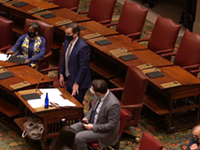
State Senate to reverse Cuomo pandemic directives
Apr 28, 2021 -

Poetry in times of strife
Apr 1, 2021 -
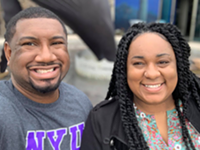
Zoom Town: Remote workers are making Rochester their home
Feb 2, 2021 - More »


